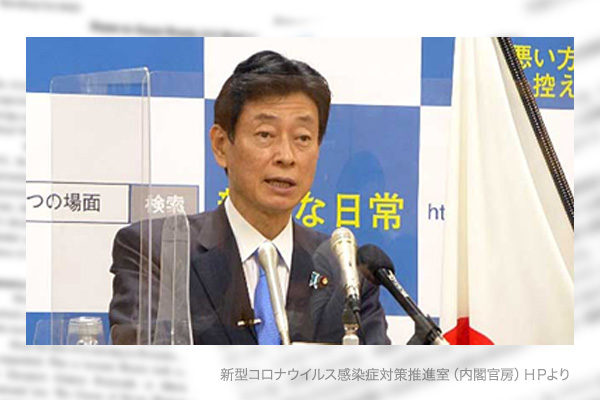Japan’s COVID-19 countermeasures have a lot of problems. In fact, the infectivity and severity of the novel coronavirus disease were found not so different from those of influenza in an early stage. In Japan where coronavirus infections and deaths have been far fewer than in Europe and the United States, coronavirus countermeasures do not have to be as tough as those in Western countries. Nevertheless, the government designated novel coronavirus as highly dangerous Category II infectious disease.
Ill effects produced by highly -dangerous disease designation
The government’s Novel Coronavirus Expert Meeting played a big role in deciding countermeasures and providing information to the public. On television almost every day, some scholars associated with the Expert Meeting called for avoiding the three Cs (closed spaces, crowded places and close-contact settings) and reducing human contacts by 80% and warned that 400,000 people might die if nothing was done. They used the hypothetical estimates to stir up fear and asked the government to declare a state of emergency. Japan Broadcasting Corp., better known as NHK, also emphasized the daily number of infections in a manner to arouse fear. The public had no choice but to accept requests for voluntary restrictions on movement and business. A feeling of fear produced ill effects including prejudice, discrimination and self-appointed enforcers of voluntary restrictions, leading to heavy economic losses.
Later on, the government lifted the state of emergency that had great negative economic impacts. But the Expert Meeting (that has been renamed the Novel Coronavirus Infectious Disease Control Subcommittee) and the Japan Medical Association have warned about possible healthcare collapse and renewed calls for voluntary restrictions, leading the government to suspend its Go to Travel and Go To Eat campaigns in the name of preventing infections. The campaigns have been designed to support tourism and food service industries hit hard by the pandemic.
The reason for healthcare collapse to be emerging in Japan, which boasts of the world’s largest number of hospital beds per population is that all patients infected with novel coronavirus have been hospitalized at a limited number of priority medical institutions for Category II infectious diseases despite the fact that 80% of novel coronavirus patients have mild or no symptoms. While more than a half of beds at priority medical institutions in Japan are still vacant, those institutions only in regions with fast-increasing infections have plunged into near healthcare collapse. Such regional crisis can be averted through interregional cooperation. Nevertheless, the government, the Subcommittee and the Japan Medical Association depend on citizens’ voluntary restrictions, abandoning efforts to resolve problems. The designation of novel coronavirus as Category II infectious disease has also seriously affected public health centers, where staff have been too busy with tracking infection routes and selecting hospitals for patients to do routine works.
Coronavirus should be treated as influenza-like disease
The Category II designation fails to meet the realities of novel coronavirus and has brought about great ill effects. When then Prime Minister Shinzo Abe offered to resign at a press conference in August, he announced a plan to shift COVID-19 to the Category V, the same category as influenza. Following the announcement, media began to explain the difference between Categories II and V. The change was expected to eliminate numerous ill effects of the Category II designation on healthcare, society and economy and allow massive financial resources to be used for preventing high-risk people from being infected and saving their lives, leading more lives to be saved.
Nevertheless, the Ministry of Health, Labor and Welfare has decided to extend the Category II designation for one more year until January 2022. If the designation were to be extended, the ministry should make its operation far more flexible to eliminate ill effects and reduce man-made disasters that add fuel to a natural disaster.
Hideaki Karaki is a professor emeritus at the University of Tokyo and a former vice president of the Science Council of Japan.


